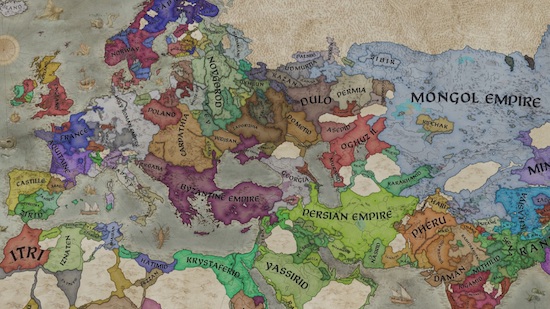“Wow,” I say to my long-suffering partner, shoving my phone in his face. “Look at this. Isn’t this ABSOLUTELY INSANE?”
He looks back to me, completely puzzled. “What am I looking at exactly? This is just a map of Europe.”
I am deflated. How could he fail to understand that what he is, in fact, looking at is a hilarious map of Europe. The empire of Italia is in Scandinavia. The British Isles are currently divided randomly into four states: The Empire of Britannia, England, Crusader England and Brittany. There is no Holy Roman Empire, but there are 40 independent microstates cluttering central Europe, at least three of them named Bavaria. Someone formed Ireland in Romania, and Iceland is a Muslim Caliphate.
“Right,” he says, after I explain this. He is not laughing, because he has not boiled his brain on 300 hours of Crusader Kings.
Crusader Kings 3 is a medieval grand strategy role-playing game released in 2020. Paradox Interactive debuted the series in 2004 with Crusader Kings, releasing its first sequel in 2012. All three Crusader Kings games blend the military strategy gameplay of tabletop games like Risk with the financial and familial management of simulation games like SimCity or even The Sims proper. Role-playing is also a major element. The definition of role-playing games (or RPGs) is extremely broad and the genre encompasses wildly different titles. I’ll describe RPGs here as games in which the player occupies the role of a character they have been assigned or have constructed from scratch and makes gameplay decisions based on how they feel that character would behave. For instance, if I were to begin playing CK3 as an “Arrogant” character with the “Imbecile” trait, I may enjoy making very ill-advised, quixotic military decisions which lead to my total financial and dynastic ruin.



